Mexico’s three presidential candidates faced off in the third and final debate on Sunday, exactly two weeks before voters go to the polls to elect a successor to President Andrés Manuel López Obrador (AMLO).
Insecurity and organized crime was one of the four broad topics considered during the debate, giving the candidates the opportunity to outline their security strategies for a country that has recorded more than 450,000 homicides since former president Felipe Calderón launched a militarized war on drug cartels shortly after he took office in late 2006.
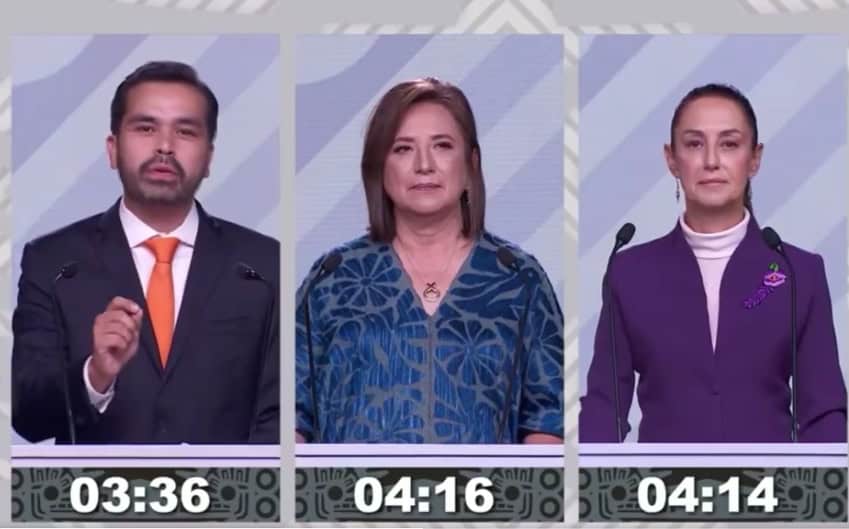
Claudia Sheinbaum, the ruling Morena party candidate and clear frontrunner, Xóchitl Gálvez of the three-party opposition alliance Strength and Heart for Mexico and Jorge Álvarez Máynez of the minor Citizens Movement (MC) party also faced questions in the areas of social policy; migration and foreign policy; and democracy, pluralism and division of powers.
As was the case in the previous debates on April 7 and April 28, Sunday night’s encounter was punctuated by accusations and personal attacks. Gálvez was particularly relentless in her pursuit of Sheinbaum, directing 24 attacks at the leading candidate, according to a count by the El Universal newspaper.
A “flash poll” conducted for the El País newspaper found that 49% of 512 respondents declared Sheinbaum the winner, while 26% asserted that Gálvez was the victor. Just under one in five of those polled — 18% — said that Álvarez Máynez came out on top.
Insecurity and organized crime
Gálvez, a former senator and ex-mayor of the Mexico City borough of Miguel Hidalgo, declared that the current security strategy — the so-called “hugs, not bullets” approach — has been a “failure” and accused the federal government of handing control of the country to organized crime.
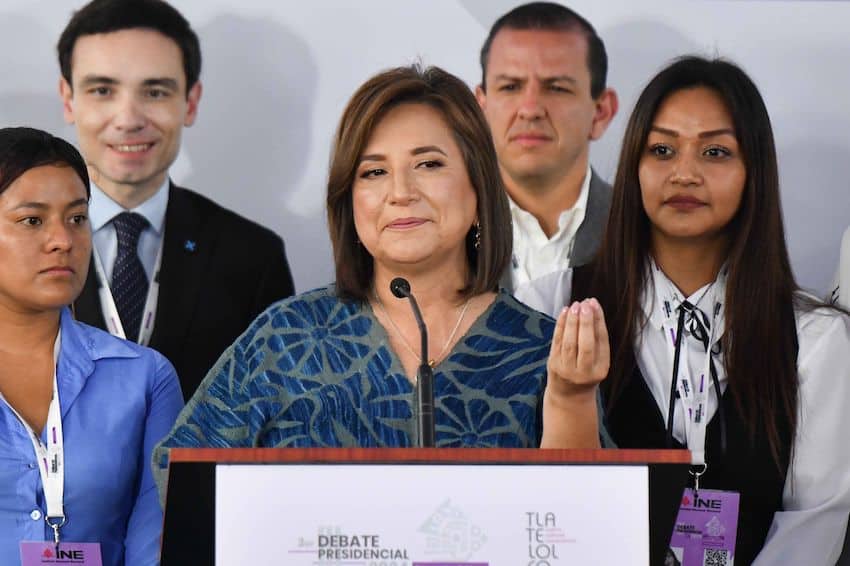
Since López Obrador took office in late 2018, there have been 186,000 murders and 50,000 people have disappeared, said the candidate for the National Action Party (PAN), the Institutional Revolutionary Party (PRI) and the Democratic Revolution Party (PRD).
“I propose a new security strategy. Hugs for criminals are over. The National Guard will have a civilian command. The armed forces will only focus on what the constitution establishes — national security. We’re going to strengthen state and municipal police, paying them well and certifying them. [Security] technology in every neighborhood. The greatest investment [ever] in culture, in sports and in public spaces. But, above all, you will have a president with the character to combat criminals,” Gálvez said.
For her part, Sheinbaum committed to continuing the current security strategy, highlighting that a government she leads would — as López Obrador says his administration has done — address the root causes of crime and violence, such as poverty and lack of opportunity, with social programs such as the Youths Building the Future and Sowing Life employment schemes. She also pledged to strengthen the National Guard, a security force that was created by the current government and placed under military control until the Supreme Court ruled that that move was unconstitutional.
Sheinbaum, mayor of Mexico City until last June, touted her security record in the capital as she attempted to demonstrate that she is best placed to combat the violent crime that plagues parts of Mexico. She also noted that national homicide numbers have trended down during López Obrador’s administration, although the president’s six-year term will still go down as the most violent on record.
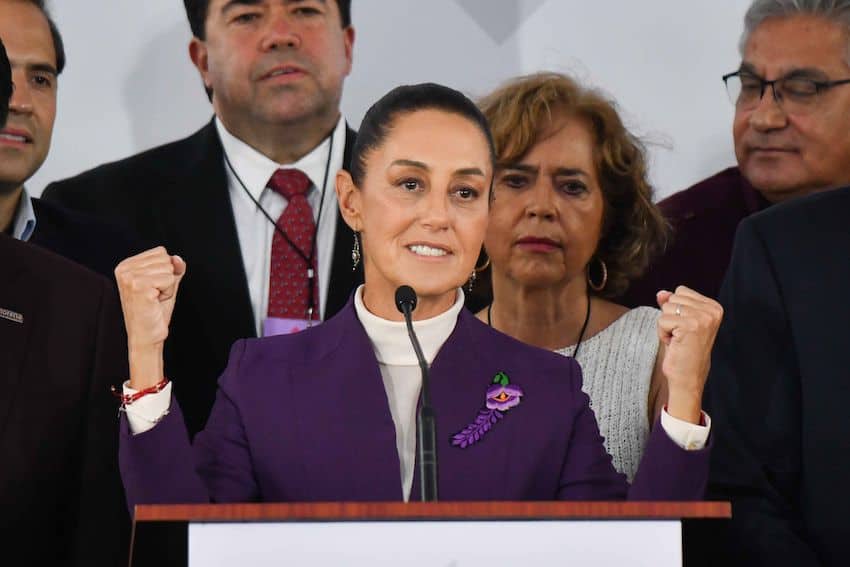
Sheinbaum said that AMLO, her political mentor, replaced a strategy of “declaring war to build peace” for one of “attention to the causes” of violence and “zero impunity.”
López Obrador has begun to bring homicide numbers down, she stressed after highlighting the increases in murders during the administrations led by Calderón (2006-12) and his successor Enrique Peña Nieto (2012-18).
Homicide numbers are still high, the Morena candidate acknowledged, but “the important thing” is that they have started coming down.
Álvarez Máynez, a former federal deputy who is in a distant third place in the polls, also committed to moving away from the use of the military for public security tasks.
Mexico needs a strategy which allows for the creation of “competent” civilian police forces, said the candidate, who claimed that the MC is the only party that doesn’t receive funding from organized crime.
“For that reason, we have the autonomy to speak about [insecurity] with freedom,” Álvarez Máynez said.
Other proposals and remarks
Social policy
While López Obrador and Morena have ample support among Mexico’s most disadvantaged citizens, Gálvez accused the government of “abandoning” Mexico’s poorest people as well as the country’s Indigenous groups, small-scale farmers, fishermen and working women.
The opposition candidate has long refuted claims that she would eliminate government social programs if elected president, and on Sunday pledged to “improve” them and introduce new ones.
“The seniors pension will begin at 60. The scholarship for children and young people will be universal. We will create 20,000 child care centers and 100,000 full-time schools,” Gálvez said.
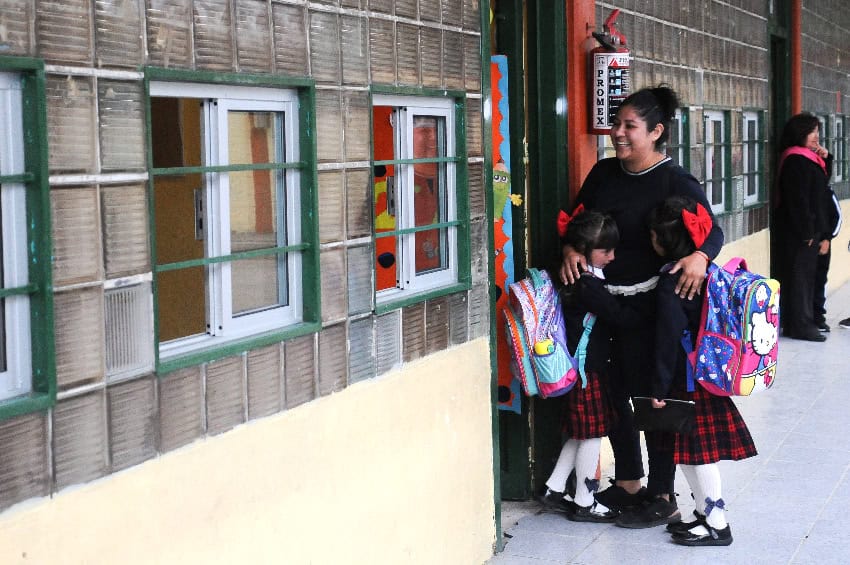
“With the new Seguro Popular [universal health care scheme] there will be [free medical] treatment and medications. But above all I commit to ending extreme poverty,” she said, pledging to lift 9 million people out of that situation.
Sheinbaum highlighted that the current government has increased the minimum wage and decreased poverty and inequality.
“For us, social policy means wellbeing and happiness for people. We’re recovering rights and broadening them,” she said, speaking of things such as education and health care.
Previous PRI and PAN governments turned such rights into “commodities” and “privileges,” Sheinbaum said.
“We’re the only ones who can maintain the social programs,” added the Morena candidate.
“We’re the only ones that have implemented them, and we do it out of conviction, not out of convenience.”
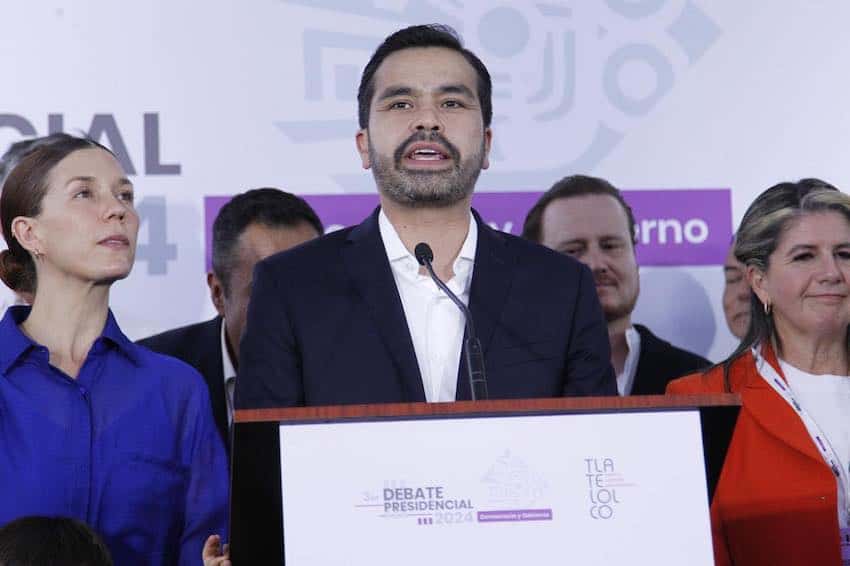
Máynez reiterated his commitment to making Mexico’s children a priority for a government he leads. The nation’s children, he said, suffer the effects of poverty and discrimination more than any other sector of society.
“That’s why we’re going to promote a new policy of attention … to generate equality of opportunities [for children],” he said.
The MC candidate also reiterated his commitment to a minimum salary of 10,000 pesos (US $600) per month and a 40-hour work week.
Migration and foreign policy
Gálvez said that her foreign policy would have “two compasses,” explaining that the first would be her “values, respect for human rights and freedoms [and] protection of migrants.”
The second would be “a map,” she said.
“We have 3,200 kilometers of border with the United States — it’s our trade ally. We’re the link between North and South America. We have an important geographic position between Europe and Asia and therefore Mexico has everything [required] to take advantage of international trade,” she said.
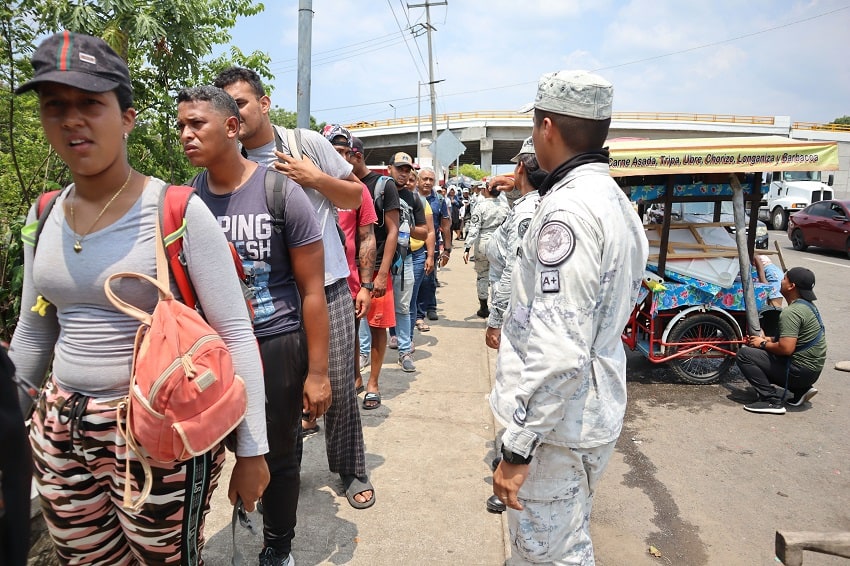
With regard to migration — specifically the use of Mexico as a transit country by large numbers of people seeking to reach the United States — the opposition candidate pledged to “establish order at the southern border,” where most migrants first enter the country.
The border with Guatemala is currently “in the hands of criminals,” Gálvez said. “Today criminals control migration and that is very serious.”
Gálvez also said that a government she leads would “demand a regularization program” for Mexican migrants in the United States.
She also highlighted the opportunity Mexico has to benefit from nearshoring.
To attract foreign companies in sectors including semiconductors, electric vehicles and aerospace, “we have to do the work,” Gálvez said.
“This government hasn’t done it and isn’t going to do it because the first thing that is needed is the rule of law. … Secondly, clean and cheap energy is needed, … water is needed, … education, science and technology is needed, … infrastructure is needed, … security is also needed,” she said.
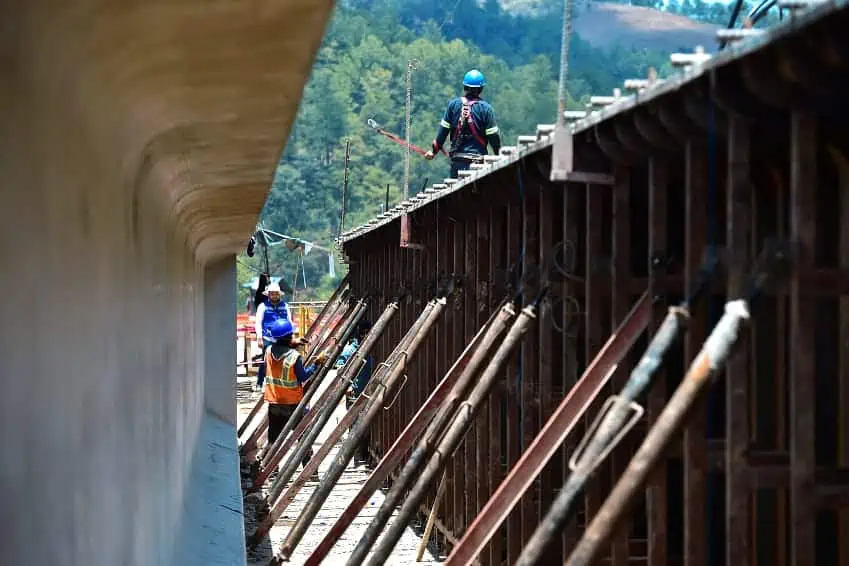
For her part, Sheinbaum committed herself to Mexico’s constitutionally-enshrined foreign policy principle of “non-intervention” in the affairs of other countries, and emphasized the need to address the causes of migration.
“We have to strengthen the relationship with the United States and Canada, we have a free trade agreement … but as [Uruguayan writer] Mario Benedetti says, the south also exists and that’s why we’re going to continue broadening relations with Latin America and the Caribbean,” said the Morena candidate, echoing remarks previously made by AMLO.
“… And of course, we will be a country that is open to the world,” she added.
Later in the segment on migration and foreign policy, Sheinbaum spoke about establishing a “development hub” in the southern border region. She also said that the current government’s signature railroad projects — the Maya Train and the modernized line across the Isthmus of Tehuantepec — could be extended to the southern border and even into Central America.
“That’s the best way to offer work to migrants,” she said.
Having heard Gálvez’s criticism of the government for allegedly not taking advantage of the nearshoring opportunity, Sheinbaum noted that foreign investment has reached record levels during the current government.
“Of course we’re open to investment, but investment with wellbeing, not the kind of investment that previous governments boasted about – ‘come and invest in Mexico because there are salaries of hunger here, cheap labor.’ No, that’s over,” she said.
“Now we’re defending Mexican workers and private investment,” Sheinbaum said.
Personal attacks and responses
Gálvez, as mentioned earlier, was relentless in her attacks on Sheinbaum. She repeatedly referred to the frontrunner as “the candidate of lies” and repeated her claim that she is a “narco-candidate” for a “narco-party.”
Sheinbaum made far fewer direct attacks on Gálvez, but frequently referred to her as “the candidate of the PRIAN,” a derogatory acronym for the PRI and the PAN that has implicit connotations of corruption.
Outlined below are two of the attacks the PAN-PRI-PRD candidate made on her main rival, and the responses of the ruling party aspirant.
- “In the previous debate, I called Claudia Sheinbaum a narco-candidate and that caused a lot of controversy,” Gálvez said. “I want to explain to millions of Mexicans why I did it. This is not a nickname nor an insult, but rather a description of facts.”
Gálvez cited a book by journalist Anabel Hernández (La historia secreta), as “clearly saying” that Sheinbaum and Omar García Harfuch, who served as the Morena candidate’s security minister in Mexico City, received “bribes” and “drugs” from organized crime.
Sheinbaum dismissed “the sources for that book” as not credible, and suggested Gálvez would find more accurate information in works of science fiction.
“Why doesn’t she read Ray Bradbury, Fahrenheit 451, or the Martian Chronicles?” she said.
- Gálvez also took aim at Sheinbaum, who has a Jewish background, for once wearing a skirt featuring the image the Virgin of Guadalupe, who is widely revered in Mexico.
The opposition candidate asked her rival — who says she is not religious but is “a woman of faith and science” — whether she had told the Pope in her recent meeting with him that she had worn the skirt even though “you don’t believe in her or in God.”
“… You have every right to not believe in God, that’s a personal issue. What you don’t have a right to is to use the faith of Mexicans as political opportunism. That is hypocrisy,” Gálvez charged.
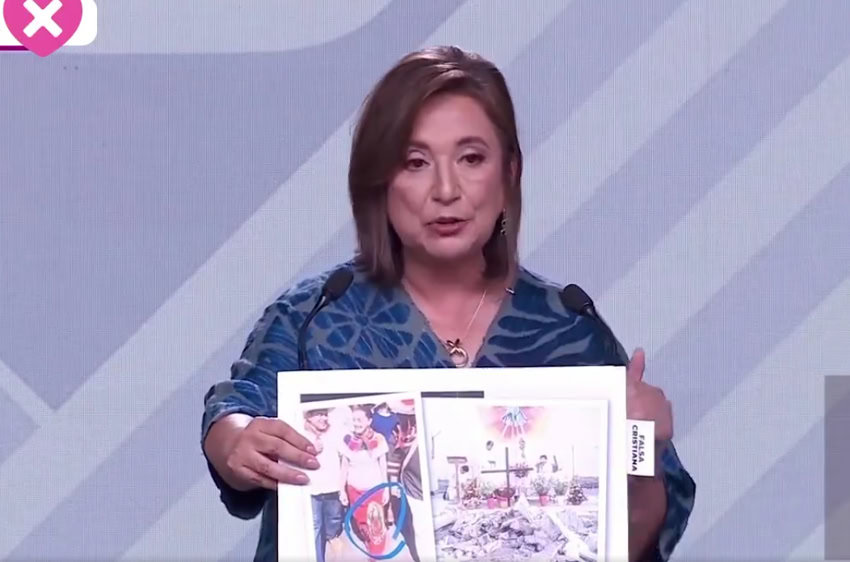
Sheinbaum described her opponent’s remark as a deliberate “provocation” and declined to comment on her use of the Virgin of Guadalupe skirt.
Earlier in the debate, the Morena candidate said that the Mexican people “don’t deserve a presidential debate full of slander and lies.”
“That reflects the absence of [a political] project,” she said.
By Mexico News Daily chief staff writer Peter Davies ([email protected])
